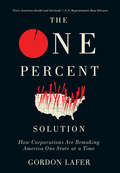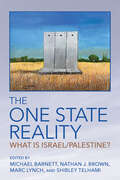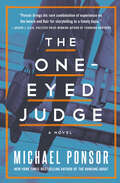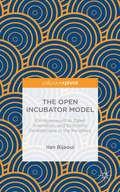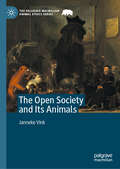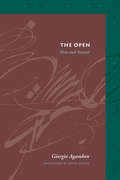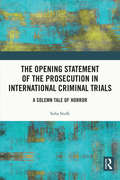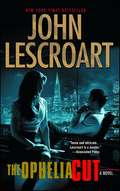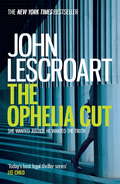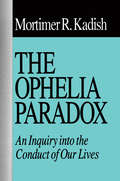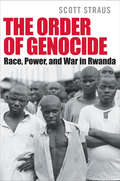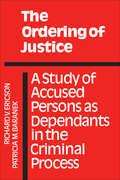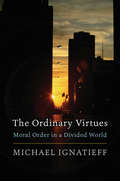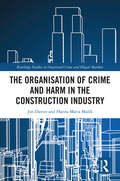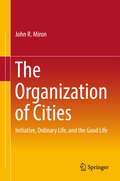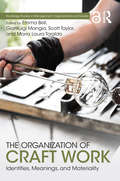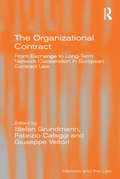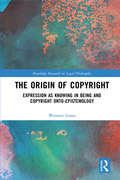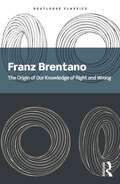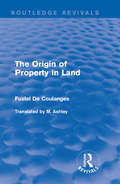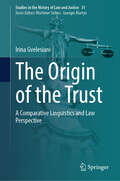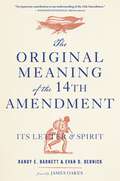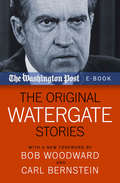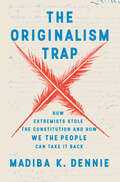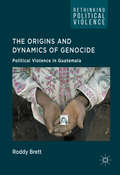- Table View
- List View
The One Percent Solution: How Corporations Are Remaking America One State at a Time
by Gordon LaferIn the aftermath of the 2010 Citizens United decision, it's become commonplace to note the growing political dominance of a small segment of the economic elite. But what exactly are those members of the elite doing with their newfound influence? The One Percent Solution provides an answer to this question for the first time. Gordon Lafer's book is a comprehensive account of legislation promoted by the nation's biggest corporate lobbies across all fifty state legislatures and encompassing a wide range of labor and economic policies.In an era of growing economic insecurity, it turns out that one of the main reasons life is becoming harder for American workers is a relentless—and concerted—offensive by the country’s best-funded and most powerful political forces: corporate lobbies empowered by the Supreme Court to influence legislative outcomes with an endless supply of cash. These actors have successfully championed hundreds of new laws that lower wages, eliminate paid sick leave, undo the right to sue over job discrimination, and cut essential public services.Lafer shows how corporate strategies have been shaped by twenty-first-century conditions—including globalization, economic decline, and the populism reflected in both the Trump and Sanders campaigns of 2016. Perhaps most important, Lafer shows that the corporate legislative agenda has come to endanger the scope of democracy itself. For anyone who wants to know what to expect from corporate-backed Republican leadership in Washington, D.C., there is no better guide than this record of what the same set of actors has been doing in the state legislatures under its control.
The One State Reality: What Is Israel/Palestine?
by Barnett, Michael, Nathan J. Brown, Marc Lynch, and Shibley Telhami, eds.The One State Reality argues that a one state reality already predominates in the territories controlled by the state of Israel. The editors show that starting with the one state reality rather than hoping for a two state solution reshapes how we regard the conflict, what we consider acceptable and unacceptable solutions, and how we discuss difficult normative questions. The One State Reality forces a reconsideration of foundational concepts such as state, sovereignty, and nation; encourages different readings of history; shifts conversation about solutions from two states to alternatives that borrow from other political contexts; and provides context for confronting uncomfortable questions such as whether Israel/Palestine is an "apartheid state."
The One-Eyed Judge: A Novel (The Judge Norcross Novels #2)
by Michael PonsorThe stunning new legal thriller from the New York Times–bestselling author of The Hanging Judge, &“a talent to watch&” (The Washington Post). When FBI agents barge into Sidney Cranmer&’s home accusing him of a heinous crime, the respected literature professor&’s life becomes a nightmare. Cranmer insists the illicit material found by the agents isn&’t his, but the charge against him appears airtight, and his academic specialty—the life and work of controversial author Lewis Carroll, creator of Alice&’s Adventures in Wonderland—convinces investigators he&’s lying. Presiding over the case against Professor Cranmer, U.S. District Judge David Norcross fears his daily confrontation with evil has made him too jaded to become a husband and father. His girlfriend, Claire Lindemann, teaches in the same department as the defendant and is convinced of his innocence. Soon, she will take matters into her own hands. Meanwhile—with his love life in turmoil and his plans for the future on hold—a personal tragedy leaves Norcross responsible for his two young nieces. Unbeknownst to him, a vengeful child predator hovers over his new family, preparing to strike. Michael Ponsor&’s debut novel, The Hanging Judge, was praised by retired Supreme Court justice John Paul Stevens for reminding readers &“that the judicial process is not infallible&” and by Pulitzer Prize–winning author Tracy Kidder for bearing &“the heft of authenticity.&” The One-Eyed Judge again draws on Ponsor&’s thirty years as a US district judge, offering readers an insider&’s view of one of the most harrowing kinds of cases faced by the courts. Fast-paced, thrilling, and thought-provoking, this is legal fiction at its most realistic and compelling. The One-Eyed Judge is the 2nd book in the Judge Norcross Novels, but you may enjoy reading the series in any order.
The Open Incubator Model: Entrepreneurship, Open Innovation, and Economic Development in the Periphery
by Ilan BijaouiThe Open Incubator Model.
The Open Society and Its Animals (The Palgrave Macmillan Animal Ethics Series)
by Janneke VinkThis book is an interdisciplinary study centred on the political and legal position of animals in liberal democracies. With due concern for both animals and the sustainability of liberal democracies, The Open Society and Its Animals seeks to redefine animals’ political-legal position in the most successful political model of our time. Advancements in modern science point out that many animals are sentient and that, like humans, they have certain elementary interests. The revised perception of animals as beings with elementary interests raises questions concerning the liberal democratic institutional framework: does a liberal democracy have a responsibility towards the animals on its territory, and if so, what kind? Do animals need legal animal rights and lawyers to represent them in court, and should they also be represented in parliament? And how much change of this kind could a liberal democracy really endure? Vink addresses these and other pressing questions relating to the political and legal position of animals in this persuasive and authoritative work, compelling us to reconsider the relationship between the open society and the animals in it.
The Open: Man and Animal (Meridian: Crossing Aesthetics)
by Giorgio AgambenThe end of human history is an event that has been foreseen or announced by both messianics and dialecticians. But who is the protagonist of that history that is coming—or has come—to a close? What is man? How did he come on the scene? And how has he maintained his privileged place as the master of, or first among, the animals? In The Open, contemporary Italian philosopher Giorgio Agamben considers the ways in which the "human" has been thought of as either a distinct and superior type of animal, or a kind of being that is essentially different from animal altogether. In an argument that ranges from ancient Greek, Christian, and Jewish texts to twentieth-century thinkers such as Heidegger, Benjamin, and Kojève, Agamben examines the ways in which the distinction between man and animal has been manufactured by the logical presuppositions of Western thought, and he investigates the profound implications that the man/animal distinction has had for disciplines as seemingly disparate as philosophy, law, anthropology, medicine, and politics.
The Opening Statement of the Prosecution in International Criminal Trials: A Solemn Tale of Horror
by Sofia StolkThis book addresses the discursive importance of the prosecution’s opening statement before an international criminal tribunal. Opening statements are considered to be largely irrelevant to the official legal proceedings but are simultaneously deployed to frame important historical events. They are widely cited in international media as well as academic texts; yet have been ignored by legal scholars as objects of study in their own right. This book aims to remedy this neglect, by analysing the narrative that is articulated in the opening statements of different prosecutors at different tribunals in different times. It takes an interdisciplinary approach and looks at the meaning of the opening narrative beyond its function in the legal process in a strict sense, discussing the ways in which the trial is situated in time and space and how it portrays the main characters. It shows how perpetrators and victims, places and histories, are juridified in a narrative that, whilst purporting to legitimise the trial, the tribunal and international criminal law itself, is beset with tensions and contradictions. Providing an original perspective on the operation of international criminal law, this book will be of considerable interest to those working in this area, as well as those with relevant interests in International/Transnational Law more generally, Critical Legal Studies, Law and Literature, Socio-Legal Studies, Law and Geography and International Relations.
The Ophelia Cut: A Novel (Dismas Hardy #14)
by John LescroartWHEN A BRUTAL RAPIST IS MURDERED, A LOVING FATHER STANDS ACCUSED OF THE CRIME. DEFENSE ATTORNEY DISMAS HARDY MUST DEFEND HIS BROTHER-IN-LAW AND OLD FRIEND MOSES McGUIRE IN A THRILLING CASE THAT HITS FAR TOO CLOSE TO HOME. Moses McGuire has good reason to be concerned about his beautiful twenty-three-year-old daughter, Brittany. She moves quickly from one boyfriend to the next, and always seems to prefer a new and mysterious stranger to a man she knows something about. But her most recent ex, Rick Jessup, isn't willing to let her go, culminating in a terrible night when Brittany is raped. Within twenty-four hours, Rick Jessup is dead, Moses McGuire is the prime suspect in the investigation, and Dismas Hardy has been hired to defend his brother-in-law. Making things even more complicated, McGuire has fallen off the wagon, and his stay in prison could bring to light old secrets that would destroy Hardy and his closest colleagues' careers. As the overwhelming evidence against McGuire piles up, Dismas Hardy focuses on planting doubt in the minds of the jurors--until, in a feat of legal ingenuity that is staggering in both its implications and its simplicity, Hardy sees a new way forward that might just save them all. But at what price? For the first time since 2009, Dismas Hardy, the author's most beloved protagonist, returns in a masterful novel that showcases Lescroart's extraordinary story-telling gifts: a cast of flesh-and-blood characters, morally complex situations, and relentless, nail-biting suspense.
The Ophelia Cut: A page-turning crime thriller filled with darkness and suspense (Dismas Hardy #14)
by John LescroartThe most personal case of Hardy's career...New York Times bestselling author John Lescroart's most beloved protagonist returns in a masterful novel showcasing all of Lescroart's extraordinary storytelling skills. Perfect for fans of Lee Child and John Sandford. 'Nothing short of magic, dark and delicious. The Ophelia Cut is the work of a master at the top of his game' - William Kent KruegerWhen Moses McGuire's daughter is raped by her ex-boyfriend, Rick Jessup, he vows to get his revenge. So when Rick is found dead the next day, Moses is arrested for murder. Dismas Hardy has no hesitation in defending his old friend but as the evidence against him starts piling up Hardy can't help wondering, what if he's actually guilty? And to make matters even more complicated, the case threatens to bring to light an old secret that could destroy Hardy's career. With the trial going against him, Hardy must draw on all his legal ingenuity until he sees a new way forward that might just save them all. But at what price?The Ophelia Cut pits lifelong friends against one another, where truth does not always lead to justice and where long buried secrets still have the power to redeem or destroy.What readers are saying about The Ophelia Cut:'Brilliant legal thriller in true Lescroart style and quality''Smooth writing, fabulous descriptions, amazing dialogue and gripping pacing''Lescroart masterfully weaves a complex plot that keeps the reader guessing throughout the book'
The Ophelia Paradox: An Inquiry into the Conduct of Our Lives
by Mortimer R. KadishIn Shakespeare's Hamlet, when Ophelia tells King Claudius, "Lord, we know what we are, but know not what we may be," she implies more than that we can never know what will happen next, that we have no grounds on which to make significant decisions in the conduct of our lives. She herself had done little or nothing to bring about her present state. Now she is quite mad. Claudius, too, could never have guessed where he would end. Yet the rest of us, although not significantly more knowing than they, profess to think we can actually make Me decisions which genuinely good reasons will support.Experience seems to have convinced us that, deficient in self-knowledge though we may be, sometimes the arrow of decision reaches its mark. Kadish examines how decisions hi the conduct of our lives are possible, how they may be justified, and what the limits of that justification might be for a self that defines itself in a context of social change. Although the need for self-justification tends to be regarded as a weakness, this book suggests that it may also be regarded as the inevitable outcome of the desire to make justifiable decisions, those for which on reflection one can approve oneself.The prime problem of the conduct of life, according to Kadish, is to say when one can and when one cannot justify oneself for one's conduct not to others but to oneself. He proposes that through self judgment individuals develop that very self-interest in virtue of which they endeavor to choose one course of action rather than another. He proposes also that they justify and form themselves through their self-identification as members of communities in conflict and in process of transformation. From this difficult social and human condition the basic problems of ethical and social theory, together with the possibility of a theory of good reasons, are held to arise.In the present time of discontent and emphasis on change hi social, economic, and political life, The Ophelia Paradox has a particular pertinence to the prospects for resolving the basic issues of conduct. It should be of interest to philosophers, sociologists, and psychologists, and of special relevance to anyone concerned with the interrelationships of ethics, art, and law.
The Order of Genocide
by Scott StrausThe Rwandan genocide has become a touchstone for debates about the causes of mass violence and the responsibilities of the international community. Yet a number of key questions about this tragedy remain unanswered: How did the violence spread from community to community and so rapidly engulf the nation? Why did individuals make decisions that led them to take up machetes against their neighbors? And what was the logic that drove the campaign of extermination? According to Scott Straus, a social scientist and former journalist in East Africa for several years (who received a Pulitzer Prize nomination for his reporting for the Houston Chronicle), many of the widely held beliefs about the causes and course of genocide in Rwanda are incomplete. They focus largely on the actions of the ruling elite or the inaction of the international community. Considerably less is known about how and why elite decisions became widespread exterminatory violence. Challenging the prevailing wisdom, Straus provides substantial new evidence about local patterns of violence, using original research-including the most comprehensive surveys yet undertaken among convicted perpetrators-to assess competing theories about the causes and dynamics of the genocide. Current interpretations stress three main causes for the genocide: ethnic identity, ideology, and mass-media indoctrination (in particular the influence of hate radio). Straus's research does not deny the importance of ethnicity, but he finds that it operated more as a background condition. Instead, Straus emphasizes fear and intra-ethnic intimidation as the primary drivers of the violence. A defensive civil war and the assassination of a president created a feeling of acute insecurity. Rwanda's unusually effective state was also central, as was the country's geography and population density, which limited the number of exit options for both victims and perpetrators. In conclusion, Straus steps back from the particulars of the Rwandan genocide to offer a new, dynamic model for understanding other instances of genocide in recent history-the Holocaust, Armenia, Cambodia, the Balkans-and assessing the future likelihood of such events.
The Ordering of Justice: A Study of Accused Persons as Dependants in the Criminal Process
by Patricia Baranek Richard EricsonFrom the point of his arrest through to the final disposition of his case, the authors follow the accused as he proceeds through the criminal control system. They draw a picture of one who is dependent upon the orders and decisions of the police, crown attorney, defence lawyer, and judge and not a defendant with significant autonomy. Substudies conducted under a program of the Centre of Criminology provide empirical material on patrol police, detectives, crown attorneys and defence lawyers and are complemented by the authors’ own interviews of accused persons. They produce a unique picture of the person who stands accused: unlike the official agents who are regular and experienced participants in the criminal process, the accused is a ‘one-shot’ player.As a dependant he is subject to the orders and decisions of the official criminal control agents; he fails to exercise what appear externally as his formal rights because the apparent costs exceed the advantages. He complies with police searches, fails to remain silent, fails to call a third party, gives a statement, often does not obtain a lawyer, routinely accepts his lawyer’s advice, rarely demands a trial, often remains silent in court, and very rarely considers an appeal. The ordering which the accused meets out of court is reproduced in the public forum of the court. Through the display of formal legal rationality there and in the belief that matters ‘could have been a lot worse,’ he experiences the ‘majesty, justice, and mercy’ of the criminal process and, in turn, accords legitimacy to the actions taken against him. The authors discuss prospects for changing the criminal process and conclude that the range of reforms that have been advocated, and sometimes implemented, does not lead to an alteration of the accused’s position within the ordering of justice because the system is not truly adversarial. Rather, it serves the interests of the state in ordering the population as well as professional interests of those who man the system.
The Ordinary Virtues: Moral Order in a Divided World
by Michael IgnatieffDuring a 3-year, 8-nation journey, Michael Ignatieff found that while human rights is the language of states and liberal elites, the moral language that resonates with most people is that of everyday virtues: tolerance, forgiveness, trust, and resilience. These ordinary virtues are the moral system of global cities and obscure shantytowns alike.
The Organisation of Crime and Harm in the Construction Industry (Routledge Studies in Organised Crime)
by Jon Davies Hanna MalikDrawing on empirical work and secondary analysis from the UK and Finnish construction industries, this book contributes a deep-rooted analysis of construction industry harms that originate from corporate-industrialstate processes.The UK context arguably represents a classic ‘neoliberal’ system categorised by privatisation of services and minimal regulation, whereas Finland broadly provides a ‘social democratic’ alternative with its relatively strong national regulation and public sector oversight of industry. These concepts interlink strongly with the notion of state-corporate crime, since this perspective shifts attention away from individualistic explanations for crime and harm towards symbiosis between states and corporations. This book argues that existing explanations based on organised crime and individual ‘rogues’ are insufficient to account for the wider range and subtlety of harms that occur in construction, and therefore offers a unique perspective into organisational, industry, and state dynamics in this sector.An accessible and compelling read, this book will appeal to students and scholars of criminology, sociology, organized crime, and those interested in harms in the construction industry.
The Organization of Cities: Initiative, ordinary life, and the good life
by John R MironThis book focuses on the relationship between the state and economy in the development of cities. It reviews and reinterprets fundamental theoretical models that explain how the operation of markets in equilibrium shapes the scale and organization of the commercial city in a mixed market economy within a liberal state. These models link markets for the factors of production, markets for investment and fixed capital formation, markets for transportation, and markets for exports in equilibrium both within the urban economy and the rest of the world. In each case, the model explains the urban economy by revealing how assumptions about causes and structures lead to predictions about scale and organization outcomes. By simplifying and contrasting these models, this book proposes another interpretation: that governance and the urban economy are outcomes negotiated by political actors motivated by competing notions of commonwealth and the individual desire for wealth and power. The book grounds its analysis in economic history, explaining the rise of commercial cities and the emergence of the urban economy. It then turns to factors of production, export, and factor markets, introducing and parsing the Mills model, breaking it down into its component parts and creating a series of simpler models that can better explain the significance of each economic assumption. Simplified models are also presented for real estate and fixed capital investment markets, transportation, and land use planning. The book concludes with a discussion of linear programming and the Herbert- Stevens and the Ripper-Varaiya models. A fresh presentation of the theories behind urban economics, this book emphasizes the links between state and economy and challenges the reader to see its theories in a new light. As such, this book will be of interest to scholars, students, and practitioners of economics, public policy, public administration, urban policy, and city and urban planning. >
The Organization of Craft Work: Identities, Meanings, and Materiality (Routledge Studies in Management, Organizations and Society)
by Scott Taylor Emma Bell Gianluigi Mangia Maria Laura ToraldoThis edited book focuses on the organization and meaning of craft work in contemporary society. It considers the relationship between craft and place and how this enables the construction of a meaningful relationship with objects of production and consumption. The book explores the significance of raw materials, the relationship between the body, the crafted object and the mind, and the importance of skill, knowledge and learning in the making process. Through this, it raises important questions about the role of craft in facing future challenges by challenging the logic of globalized production and consumption. The Organization of Craft Work encompasses international analyses from the United States, France, Italy, Australia, Canada, the UK and Japan involving a diverse range of sectors, including brewing, food and wine production, clothing and shoe making, and perfumery. The book will be of interest to students and academic researchers in organization studies, marketing and consumer behaviour, business ethics, entrepreneurship, sociology of work, human resource management, cultural studies, geography, and fashion and design. In addition, the book will be of interest to practitioners and organizations with an interest in the development and promotion of craft work.
The Organizational Contract: From Exchange to Long-Term Network Cooperation in European Contract Law (Markets And The Law Ser.)
by Stefan Grundmann Fabrizio CafaggiThis book introduces and develops the paradigm of the organisational contract in European contract law. Suggesting that a more radical distinction should be made between contracts which regulate single or spot exchanges and contracts that organize complex economic activities without creating a new legal entity, the book argues that this distinction goes beyond that between spot and relational contracts because it focuses on the organizational dimension of contracting and its governance features. Divided into six parts, the volume brings together a group of internationally renowned experts to examine the structure of long-term contractual cooperation; networks of contracts; knowledge exchange in long-term contractual cooperation; remedies and specific governance rules in long-term relationships; and the move towards legislation. The book will be of value to academics and researchers in the areas of private law, economic theory and sociology of law, and organizational theory. It will also be a useful resource for practitioners working in international contract law and international business transaction law.
The Origin of Copyright: Expression as Knowing in Being and Copyright Onto-Epistemology (Routledge Research in Legal Philosophy)
by Wenwei GuanContemporary copyright was born in a heroic era of human history when technologies facilitated idea dissemination through the book trade reaching out mass readership. This book provides insights on the copyright evolution and how proprietary individual expression’s copyright protection forms an integral part of our knowing in being, driven by the advances of technology through the proliferating trading frameworks. The book captures what is central in the process of copyright evolution which is an "onto-epistemological offset". It goes on to explain that copyright’s protection of knowing in originality’s delineation of expression and fair use/dealing’s legitimization of unauthorized use and being are not isolatable, but rather mutually implicated. While the classic strict determinism has been subject to an onto-epistemological challenge, the book looks at the proliferation of global trade and advent of information technology and how they show us the beauty and possibility of intra-dependence between copyright authorship, entrepreneurship, and readership, which calls for a fresh copyright onto-epistemology. Building on its onto-epistemological critiques on the stakeholder, force, and mechanism of copyright evolution, the book helps readers understand why, not only copyright, but also law in general, and justice too, need to be onto-epistemologically balanced, as this is categorically imperative for being, the fundamental law of nature.
The Origin of Our Knowledge of Right and Wrong (Routledge Classics)
by Franz Brentano"Is there such a thing as a moral truth taught by nature itself and independent of ecclesiastical, political, and every other kind of social authority? Is there a moral law that is natural in the sense of being universally and incontestably valid—valid for men at all places and all times, indeed valid for any being that thinks and feels—and are we capable of knowing that there is such a law? ... My own answer is emphatically affirmative." —Franz Brentano, The Origin of Our Knowledge of Right and WrongFranz Brentano is one of the founding figures of twentieth century philosophy, celebrated for introducing the concept of intentionality as well as making significant contributions to ethics, philosophy of psychology and logic. He counted Sigmund Freud, Rudolf Steiner and Edmund Husserl amongst his students, and Freud wrote to his teacher to express his great admiration for him.The Origin of Our Knowledge of Right and Wrong is Brentano's most important book on ethics and moral philosophy. Hailed by the Cambridge philosopher G.E. Moore as 'a far better discussion of the most fundamental principles of Ethics than any others with which I am acquainted', it is based on an important lecture Brentano delivered in Vienna in 1889 and the product of many years of reflection on its subject matter. Breaking with earlier arguments that ideas of right and wrong are innate, Brentano seeks to overcome a major challenge: if there is no such thing as objective moral goodness, can our moral judgments themselves still be objective, independent of context or human conventions? Brentano's answer is that they can, but only if we understand correctly the function of moral thought and discourse. His bold and highly original insight is that emotions are a precondition for moral knowledge and our experience of them can be right or wrong: if it is correct or fitting to love something we can say it is good, and if it is fitting to hate it, it is bad.Moving deftly through key figures in the history of philosophy, including Descartes and John Stuart Mill, The Origin of Our Knowledge of Right and Wrong is a pioneering work of ethics that continues to influence both analytical and phenomenological traditions in philosophy.This Routledge Classics edition includes a helpful account of Brentano's life and major works and a Foreword, both by Uriah Kriegel, explaining some of Brentano’s core ideas and arguments. Also included are a significant excerpt from Brentano's The Foundation and Construction of Ethics, and a historically important review by G.E. Moore of The Origin of Our Knowledge of Right and Wrong on the book's first publication.
The Origin of Property in Land (Routledge Revivals)
by Fustel De CoulangesDe Coulanges original study provided a historical view of how land has become property which was then translated and published in 1891 by M. Ashley, not just to bring this study to an English reader but to provide a counter argument to Agrarian Communism. This edition also contains an introductory chapter on the origin of the manor house in England. This title will be of interest to students of History.
The Origin of the Trust: A Comparative Linguistics and Law Perspective (Studies in the History of Law and Justice #31)
by Irina GvelesianiThis book offers an interdisciplinary approach that covers linguistics and jurisprudence, shows the interconnectedness of law and language, singles out major theories related to the emergence of the concept of trust and discusses them from the perspective of legal linguistics. Contemporary globalizing processes change the contours of different spheres of life. Against the backdrop of ongoing changes, an overall tendency emerges of the unifying and harmonizing legal systems. The dominance of American and English law firms fuels a broader worldwide circulation of Anglo-American legal concepts and instruments. Increasing contacts of non-trust jurisdictions with trustees and trust assets promote the use of trusts and trust-like devices in civil law jurisdictions. As a result, the interest towards the entrusting relationships increases. The research in this book is based on the methods of descriptive and structural-semantic analyses. Emphasis is put on the interinfluence of the West Germanic languages and the laws of the Germanic tribes, the Salian Franks and the Anglo-Saxons. The book consults selected Franconian manuscripts, lex salica and lex ripuaria, and dictionaries for the study and interpretation of the trust-related lexical units. The results of the research shed a new light on the origin of the common law trust and its predecessor use. The book is intended for legal linguists, lawyers, legal practitioners, legal historians and for researchers and students in the fields of trust law, legal linguistics, and legal history.
The Original Meaning of the Fourteenth Amendment: Its Letter and Spirit
by Randy E. Barnett Evan D. BernickA renowned constitutional scholar and a rising star provide a balanced and definitive analysis of the origins and original meaning of the Fourteenth Amendment. Adopted in 1868, the Fourteenth Amendment profoundly changed the Constitution, giving the federal judiciary and Congress new powers to protect the fundamental rights of individuals from being violated by the states. Yet, according to Randy Barnett and Evan Bernick, the Supreme Court has long misunderstood or ignored the original meaning of the amendment’s key clauses, covering the privileges and immunities of citizenship, due process of law, and the equal protection of the laws. Barnett and Bernick contend that the Fourteenth Amendment was the culmination of decades of debates about the meaning of the antebellum Constitution. Antislavery advocates advanced arguments informed by natural rights, the Declaration of Independence, and the common law. They also utilized what is today called public-meaning originalism. Although their arguments lost in the courts, the Republican Party was formed to advance an antislavery political agenda, eventually bringing about abolition. Then, when abolition alone proved insufficient to thwart Southern repression and provide for civil equality, the Fourteenth Amendment was enacted. It went beyond abolition to enshrine in the Constitution the concept of Republican citizenship and granted Congress power to protect fundamental rights and ensure equality before the law. Finally, Congress used its powers to pass Reconstruction-era civil rights laws that tell us much about the original scope of the amendment. With evenhanded attention to primary sources, The Original Meaning of the Fourteenth Amendment shows how the principles of the Declaration eventually came to modify the Constitution and proposes workable doctrines for implementing the key provisions of Section 1 of the Fourteenth Amendment.
The Original Watergate Stories
by The Washington Post&“5 Held in Plot to Bug Democrats&’ Offices&”: The legendary articles that exposed a crime, ended a presidency, and changed a nation. The Washington Post&’s seminal Watergate stories have been gathered together for the first time as an e-book, including a foreword by journalists Bob Woodward and Carl Bernstein assessing the impact of their stories decades later. "5 Held in Plot to Bug Democrats' Offices Here", said the headline at the bottom of page one in the Washington Post on Sunday, June 18, 1972. The story reported that a team of burglars had been arrested inside the offices of the Democratic National Committee in the Watergate office complex in Washington. On assignment, Carl Bernstein and Bob Woodward uncovered a widespread political scandal and cover-up at the highest levels of government, culminating with the resignation of President Richard Nixon. The Post won a Pulitzer Prize for its work, which became the subject of two bestselling books and a renowned movie, All the President's Men. This eBook is a look back at the dramatic chain of events that would convulse Washington for two years and lead to the first resignation of a U.S. president, forever changing American politics.
The Originalism Trap: How Extremists Stole the Constitution and How We the People Can Take It Back
by Madiba K. DennieA rallying cry for a more just approach to the law that bolsters social justice movements by throwing out originalism—the theory that judges should interpret the Constitution exactly as conservatives say the Founders meant it&“The greatest trick conservatives ever pulled was convincing the world that originalism exists. This book is vital for understanding why the world sucks right now.&”—Elie Mystal, author of Allow Me to RetortThere is no one true way to interpret the Constitution, but that&’s not what originalists want you to think. They&’d rather we be held hostage to their &“objective&” theory that our rights and liberties are bound by history—an idea that was once confined to the fringes of academia. Americans saw just how subjective originalism can be when the Supreme Court cherry-picked the past to deny bodily autonomy to millions of Americans in Dobbs v. Jackson Women&’s Health. Though originalism is supposed to be a serious intellectual theory, a closer look reveals its many inherent faults, as it deliberately over-emphasizes a version of history that treats civil rights gains as categorically suspect. According to Madiba K. Dennie, it&’s time to let it go.Dennie discards originalism in favor of a new approach that serves everyone: inclusive constitutionalism. She disentangles the Constitution&’s ideals from originalist ideology and underscores the ambition of the Reconstruction Amendments, which were adopted in the wake of the Civil War and sought to build a democracy with equal membership for marginalized persons. The Originalism Trap argues that the law must serve to make that promise of democracy real.Seamlessly blending scholarship with sass and written for law people and laypeople alike, The Originalism Trap shows readers that the Constitution belongs to them and how, by understanding its possibilities, they can use it to fight for their rights. As courts—and the Constitution—increasingly become political battlegrounds, The Originalism Trap is a necessary guide to what&’s at stake and a vision for a more just future.
The Origins and Dynamics of Genocide:
by Roddy BrettThis book rigorously documents and explains the genocide perpetrated by the Guatemalan state against indigenous Maya populations within the context of its counterinsurgency campaign against leftist guerrillas between 1981 and 1983. In doing so it brings to light a genocide that has remained largely invisible within both academic disciplines and the practitioner sphere. In May 2013, former de facto president of Guatemala, General Efrain Rios Montt, was for ten days indicted for genocide and crimes against humanity within Guatemala's domestic courts. Based upon over a decade of ethnographic research, including in survivors' communities in Guatemala, this book documents the historical processes shaping the genocide by analysing the evolution of both counterinsurgent and insurgent violence and strategy, focusing above all on its impact upon the civilian population. The research clearly evidences the impact of political violence upon non-combatants; how military and insurgent strategies gradually implicate civilians in conflict and the strategies civilians may adopt in order to survive them. Convincingly framed within key theoretical scholarship from genocide studies and comparative politics it speaks to a broad audience beyond Latin Americanists.
